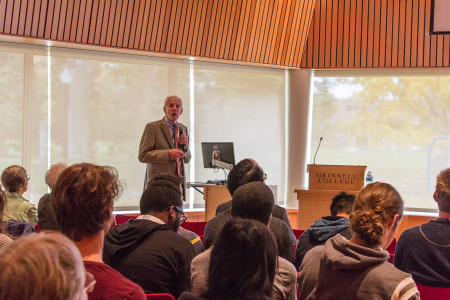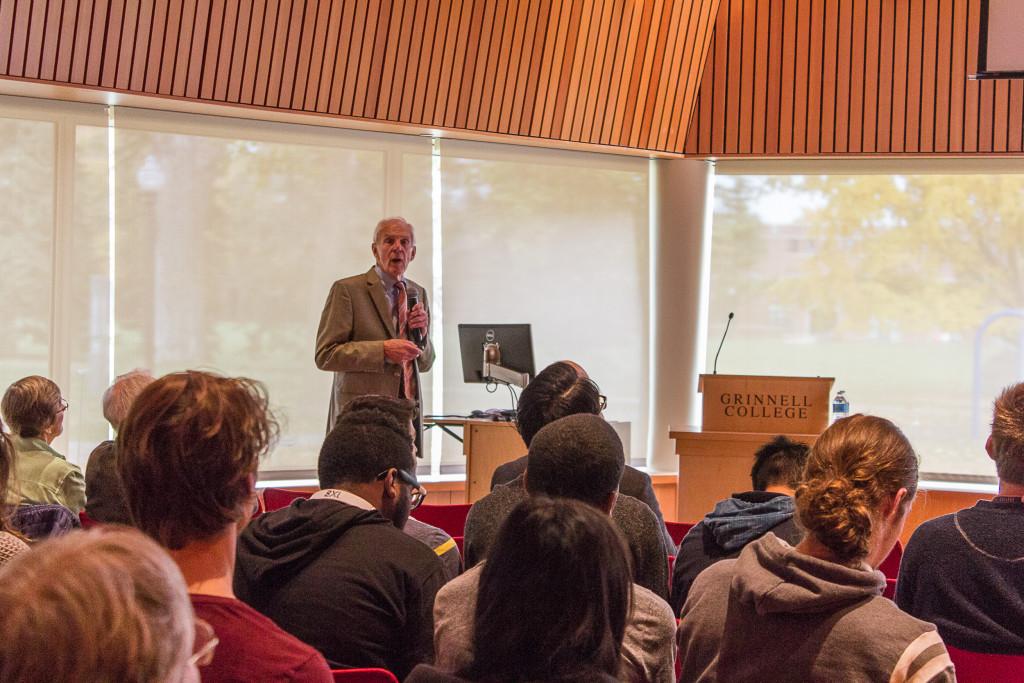
JACK O’MALLEY, Copy Editor
omalleyj17@grinnell.edu
The labor market may seem like an abstract concept with no real impact on our day-to-day lives, but the realities of the economic landscape will soon have consequences for future graduates. Yesterday, Nov. 5, Robert Haveman came to the College to give a talk about the U.S. labor market. The title of his talk, “The U.S. labor market is a mess,” summed up the thesis of his lecture nicely.
Haveman is a Professor Emeritus of Economics and Public Affairs and Research Associate at the Institute for Research on Poverty at University of Wisconsin-Madison. He has had a long career doing research, authoring books and teaching at various universities. He even began his career at Grinnell and has returned many times over the years.
According to Professor Mark Montgomery, Economics, in his introduction, Haveman is the author of 17 books, the editor of 13, has published more than 100 articles in peer-reviewed research journals and many more in conference volumes.
Haveman began his talk by quickly running through all of the current issues facing the labor market. He noted how slow the economy has been to recover since the Great Recession in 2008, emphasizing how there has been consistent long-term unemployment.
“We have witnessed a persistent decline in the employment-population ratio. This is the ratio of the number of workers to the working age population. We’ll see that wage increases no longer reflect productivity increases. Family incomes are stagnant. Labor share of the income produced by the economy is, in fact, shrinking and there is growing wage income inequality,” Haveman said.
All of these problems were elaborated upon in detail throughout his talk. In wrapping up discussion of the current economic problems, Haveman focused on the income inequality and poverty levels that face the U.S.
“What kind of a country is this? … Middle class families can no longer depend upon good employment and wages when the economy expands, wage and income inequality has grown and top earners have pulled away from everybody else,” Haveman said. “For a rich country like this, our poverty rates are embarrassingly high, and growing. The strength of worker-oriented institutions has eroded and we’ve enabled people with resources to translate their resources into political influence.”
Beyond simply describing the economic landscape, Haveman went on to explain how these trends have evolved. The obvious answer lies in the 2008 Great Recession from which the country has not fully recovered. Besides this, Haveman points towards increasing globalization, a technology revolution that has driven up capital-intensive investments, lagging education rates and an erosion of the minimum wage.
Haveman ended his talk by describing some solutions to these issues. His main proposal was to increase education rates by making it financially easier for students to attend school.
“Is there a way out? Well, probably. If we increased high school and college graduation rates we’d have a more skilled labor force … We should increase the subsidies given to the lowest paid workers,” Haveman said. “We probably should entertain the idea of an increase of the minimum wage. We certainly should increase federal support for job training and try to consolidate the tangle of job training programs. Clearly, we should raise taxes on the highest income earners.”
As far as the reality of any or all of this happening Haveman was not all that optimistic. He noted that nothing will likely get done due to the limitations of Congress.
“With the Congress we have not much is likely to take place,” Haveman said. “The nation is likely to continue to muddle along in this pickle and that’s too bloody bad.”





























































